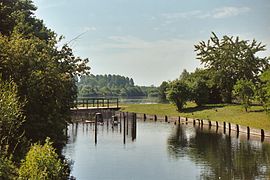Falvy
Falvy | |
|---|---|
 Falvy Lake | |
 Coat of arms | |
show Location of Falvy | |
 Falvy | |
| Coordinates: 49°49′30″N 2°57′35″E / 49.825°N 2.9597°ECoordinates: 49°49′30″N 2°57′35″E / 49.825°N 2.9597°E | |
| Country | France |
| Region | Hauts-de-France |
| Department | Somme |
| Arrondissement | Péronne |
| Canton | Ham |
| Intercommunality | CC Est de la Somme |
| Government | |
| • Mayor (2020–2026) | Frédéric Lecomte[1] |
| Area 1 | 6.32 km2 (2.44 sq mi) |
| Population (Jan. 2018)[2] | 153 |
| • Density | 24/km2 (63/sq mi) |
| Time zone | UTC+01:00 (CET) |
| • Summer (DST) | UTC+02:00 (CEST) |
| INSEE/Postal code | 80300 /80190 |
| Elevation | 51–91 m (167–299 ft) (avg. 60 m or 200 ft) |
| 1 French Land Register data, which excludes lakes, ponds, glaciers > 1 km2 (0.386 sq mi or 247 acres) and river estuaries. | |
Falvy is a commune in the Somme department in Hauts-de-France in northern France.
Geography[]
Falvy is situated on the D103 road, on the banks of the river Somme, some 19 miles (31 km) west of Saint-Quentin.
History[]
Falvy originated as a Gaulish village. Known by different names over the centuries :Fala, Falvicum in 1135, Phalevi in 1146, then Fallevy or Falevi sur Somme and finally Falvy Principle events :
- In the 12th century, Raoul I de Nesle, seigneur of both Nesle and Falvy, gave the windmill of Falvy-sur-Somme to the church at Saint-Quentin.
- 1629 and Louis XIII dismantles the château, a medieval fortress
- On 22 November 1916, fighter-ace-pilot Georges Guynemer claimed his 23rd victim at Falvy.
- On 9 August 1918, the bridge at Falvy was attacked by Lieutenant James Alfred Keating, an American volunteer in the RFC. He won the Distinguished Flying Cross.
Population[]
| Year | 1954 | 1962 | 1968 | 1975 | 1982 | 1990 | 1999 | 2006 |
|---|---|---|---|---|---|---|---|---|
| Population | 138 | 117 | 118 | 108 | 116 | 106 | 100 | 142 |
| From the year 1962 on: No double counting—residents of multiple communes (e.g. students and military personnel) are counted only once. | ||||||||
Places of interest[]
- The church of Saint Benoite has dimensions that are relative to a time when the population was larger. Its origin was as a chapel to the chateau. It was victim of revolutionary vandalism in 1792, losing much of its embellishment and harmony by such destruction.
- The lake
See also[]
References[]
- ^ "Répertoire national des élus: les maires". data.gouv.fr, Plateforme ouverte des données publiques françaises (in French). 2 December 2020.
- ^ "Populations légales 2018". INSEE. 28 December 2020.
| Wikimedia Commons has media related to Falvy. |
Categories:
- Communes of Somme (department)
- Péronne arrondissement geography stubs


